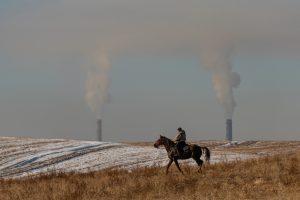For more than decade, gas and oil rich Kazakhstan has made bold pledges on transitioning to renewable energy, in step with global concern about the causes an implications of climate change. But concrete progress has long been difficult for Kazakhstan, and now Astana’s position appears to have shifted dramatically.
On September 26, during a meeting of Kazakhstan’s National Council on Science and Technology, Kazakh President Kassym-Jomart Tokayev twice quoted U.S. President Donald Trump, expressing apparent skepticism about climate change and renewable energy.
“I participated in the global climate summits in Dubai and Baku… frankly, everything that is happening looks like a large-scale fraud,” Tokayev said, referring to COP28 and COP29.
“Recently,” the Kazakh president went on, “U.S. President Donald Trump made a similar statement from the U.N. podium: ‘Climate change is the greatest fraud ever perpetrated in the world.’”
COP30, the 30th United Nations Framework Convention on Climate Change (UNFCCC), will convene in Belém, Brazil next month. The conference comes at a time when the leader of the second-largest greenhouse gas emitter in the world, and global leaders keen to curry favor with him, are blatantly rejecting what has long been established science.
As Oliver Reschreiter, a Ph.D. fellow at the Institute of European Studies at Jagiellonian University, wrote in an article for The Diplomat last month a week before Tokayev’s dramatic reversal:
As far back as 2012, then-President Nursultan Nazarbayev launched the Kazakhstan-2050 Strategy, declaring that the fossil fuel era was coming to an end and setting an aspirational target of generating half of all electricity from alternative and renewable sources by 2050. To give substance to that vision, Nazarbayev issued a decree the following year adopting the Concept for Transition to a Green Economy, which established incremental goals of 3 percent renewables by 2020, 10 percent by 2030, and 50 percent by 2050.
Further agenda-setting from current President Kassym-Jomart Tokayev appeared to reinforce these ambitions, with his administration in 2021 unveiling the Doctrine of Carbon Neutrality, pledging Kazakhstan would achieve net-zero emissions by 2060. Tokayev also increased the renewables target for 2030 from 10 to 15 percent.
Reschreiter went on to remark on the tension between these pledges and the reality of energy in Kazakhstan:
Fossil fuels still dominate Kazakhstan’s energy mix, supplying around 85 percent of electricity, with coal alone providing more than half. Renewable capacity has expanded in recent years, but the pace remains too modest to reach the 15 percent goal pledged for 2030.
Will Kazakhstan abandon its past pledges? Tokayev seemed to make the precursor case to do so, arguing in his September 26 remarks that “as digitalization and artificial intelligence develop, the country’s energy demand will grow rapidly.” After mentioning “efficiency,” Tokayev turned to coal.
“First and foremost, this concerns coal. Kazakhstan produces 113 million tons of coal annually, placing it among the top ten countries in the world in this indicator,” he said.
Once again Tokayev quoted Trump: “The U.S. president rightly said, ‘I don’t like wind, I like coal.’”
Tokyev complained that wind turbines, and the energy they produce, is “extremely expensive” and repeated claims Trump has also made that they “can cause serious damage to the environment.”
Coal, Tokayev said, can be made “clean” and is less expensive.
“Clean coal,” experts argue, is a myth – a dangerous one. As a political construct, the concept of “clean coal” is useful, but in practical terms burning coal remains an extremely dirty business.
As Paolo Sorbello laid out, via expert interviews, in a recent article for Vlast.kz, the advanced technologies at the heart of “clean coal” arguments are not a reality in Kazakhstan at present, where thermal power plants are in an “abysmal state.”
In September 2023, when Tokayev took the podium at the 78th U.N. General Assembly’s General Debate, he urged global action on climate issues and advocated for a “gradual, sustainable, and socially responsible transition away from coal…”
The following year, when then-Kazakh Foreign Minister Murat Nurtleu delivered Astana’s remarks at the General Debate, he characterized climate change as an “existential threat no nation can afford to ignore.”
But when Tokayev took the podium last month at the 80th U.N. General Debate, his tune had begun to change. “Climate change and the green agenda cannot be accepted by all countries that have huge deposits like coal, which nowadays can be cleaned up by advanced technologies,” Tokayev said. It was his only mention of climate change in the 26-minute speech.
Where does this about-face leave Kazakhstan? For more than a decade, pledges to transition to renewable energy have brought in investment deals. And arguments about climate change were fundamental to the government’s case in favor of constructing nuclear power plants.
Tokayev may have changed his tune to align himself with Trump at a time when world leaders are scrambling to find ways to reliably connect with the capricious U.S. president. Immediately after the U.N. General Assembly, during which Uzbek President Shavkat Mirziyoyev scored a sit-down with Trump and Tokayev came away with a photo-op, Tokayev reshuffled his foreign policy team. The Kazakh ambassador to the U.S. was recalled and Nurtleu was reassigned.
Meanwhile, the shift in tone regarding climate change and the environmental effects of coal will serve to illustrate once again to Kazakh citizens – whose air is at times unbreathable and whose snow is occasionally black – that Astana isn’t listening.





























